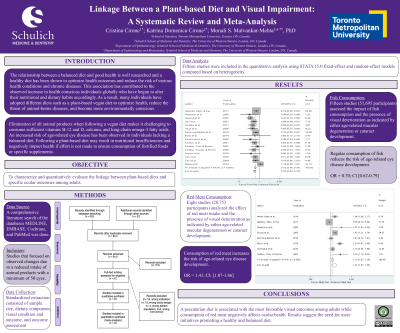Back

Objectives: The purpose of this paper is to characterize the relationship between plant-based diets and specific ocular outcomes among adults.
Methods: Data Sources: A comprehensive literature review was performed using the databases MEDLINE, EMBASE, Cochrane, and PubMed up until December 19, 2021.
Study Selection: Studies that focused on observed visual changes due to a reduced intake of animal products with a minimum of 50 eyes were eligible for inclusion.
Data Extraction: Two levels of screening, quality assessment, and data extraction were conducted by two reviewers independently. The twenty-one studies identified from 814 unique studies progressed to data extraction and fifteen were included in the quantitative analysis using STATA 15.0 fixed-effect and random-effect models computed based on heterogeneity.
Results: Fifteen studies (51695 participants) assessed the impact of fish consumption, eight studies (28753 participants) analyzed the effect of red meat intake, and three studies (7723 participants) assessed the impact of omission of skim milk, poultry, and non-meat animal products and the presence of visual deterioration as indicated by age-related macular degeneration, age-related maculopathy, or cataract development. Meta-analysis indicated regular consumption of fish (OR = 0.70; CI: [0.62-0.79]) and skim milk, poultry, and non-meat animal products (OR = 0.70; CI: [0.61-0.79]) reduced the risk of visual impairment among adults. Consumption of red meat [OR = 1.41; CI: [1.07-1.86]) may increase the risk of visual impairment.
Conclusions: A pescatarian diet is associated with the most favorable visual outcomes among adults while consumption of red meat negatively impacts vision. Results suggest a need for more initiatives promoting a healthy and balanced diet.
Funding Sources: Not applicable
Dietary Patterns
(PO08-07-22) Linkage Between a Plant-based Diet and Visual Impairment: A Systematic Review and Meta-Analysis

- CC
Cristina Cirone
– Student, Ryerson University, Toronto, Ontario, Canada - KC
Katrina D. Cirone
– Schulich School of Medicine and Dentistry
Presenting Author(s)
Co-Author(s)
Disclosure(s):
Cristina Cirone: No relevant financial relationship(s) with ineligible companies to disclose.
Objectives: The purpose of this paper is to characterize the relationship between plant-based diets and specific ocular outcomes among adults.
Methods: Data Sources: A comprehensive literature review was performed using the databases MEDLINE, EMBASE, Cochrane, and PubMed up until December 19, 2021.
Study Selection: Studies that focused on observed visual changes due to a reduced intake of animal products with a minimum of 50 eyes were eligible for inclusion.
Data Extraction: Two levels of screening, quality assessment, and data extraction were conducted by two reviewers independently. The twenty-one studies identified from 814 unique studies progressed to data extraction and fifteen were included in the quantitative analysis using STATA 15.0 fixed-effect and random-effect models computed based on heterogeneity.
Results: Fifteen studies (51695 participants) assessed the impact of fish consumption, eight studies (28753 participants) analyzed the effect of red meat intake, and three studies (7723 participants) assessed the impact of omission of skim milk, poultry, and non-meat animal products and the presence of visual deterioration as indicated by age-related macular degeneration, age-related maculopathy, or cataract development. Meta-analysis indicated regular consumption of fish (OR = 0.70; CI: [0.62-0.79]) and skim milk, poultry, and non-meat animal products (OR = 0.70; CI: [0.61-0.79]) reduced the risk of visual impairment among adults. Consumption of red meat [OR = 1.41; CI: [1.07-1.86]) may increase the risk of visual impairment.
Conclusions: A pescatarian diet is associated with the most favorable visual outcomes among adults while consumption of red meat negatively impacts vision. Results suggest a need for more initiatives promoting a healthy and balanced diet.
Funding Sources: Not applicable

.png)
